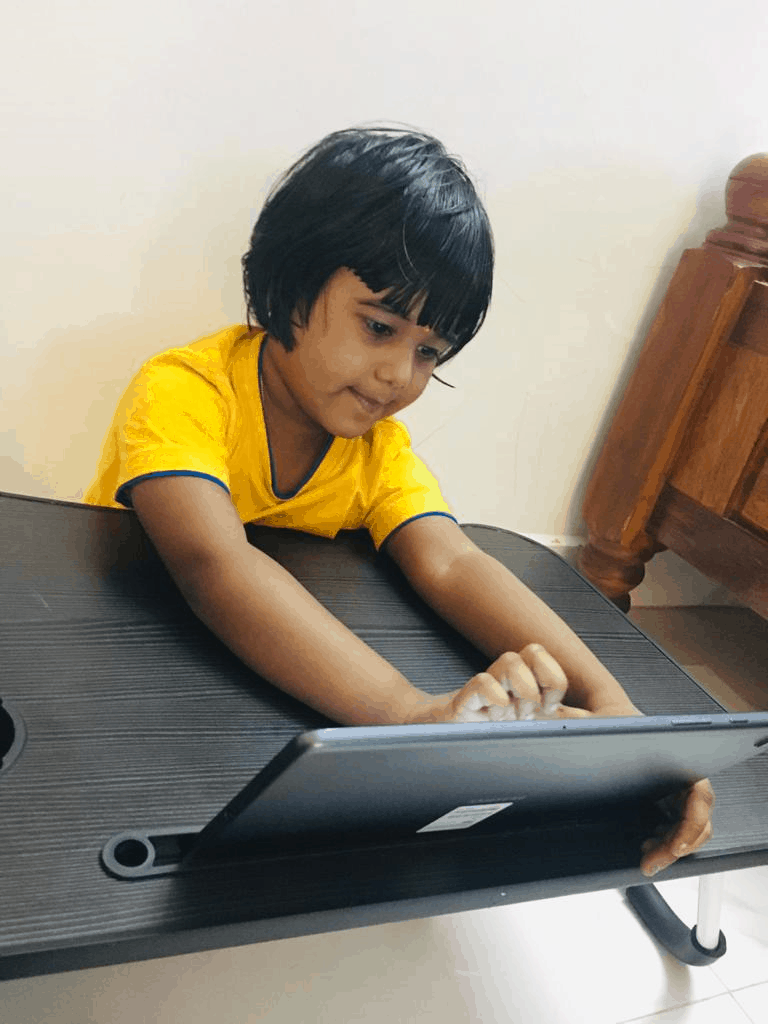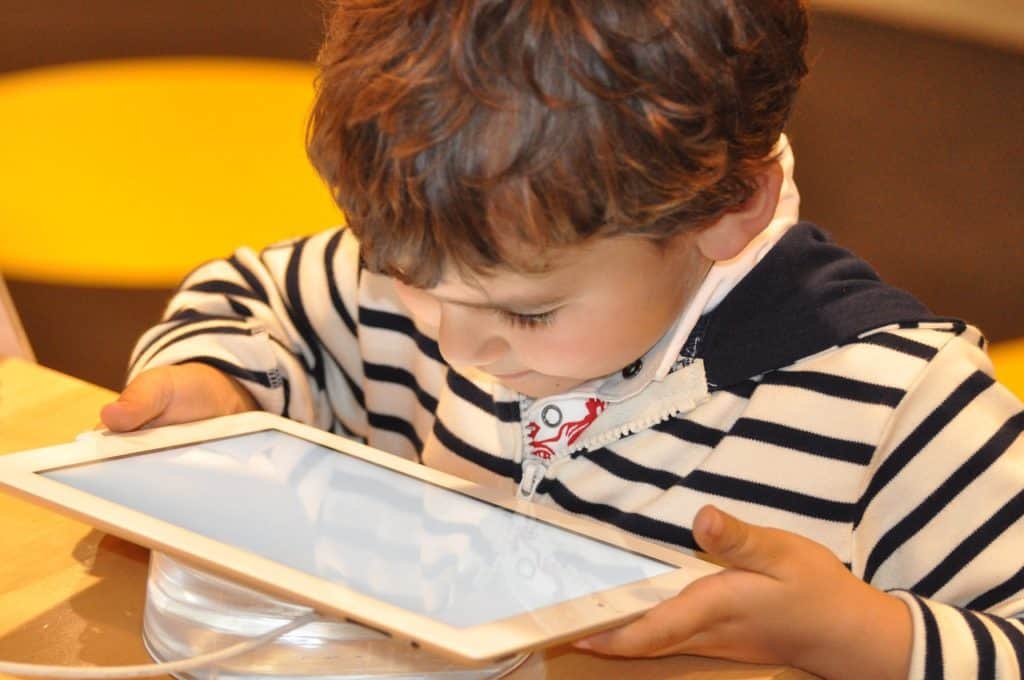Sandhya R, a 3-year-old preschooler, gets distracted and restless every five minutes even while her online classes are underway. Her mother, R Saritha, an IT employee from Adyar, has to take a break from work often to pacify her and get her back to focussing on the screen. “Since my work is flexible, I have the advantage of being able to take breaks to attend to my daughter when she needs me. But online classes have been very challenging, as she is too young to concentrate on, or engage with, what is happening in these virtual classes,” shares Saritha, a single parent.
It has been difficult for everyone to get accustomed to the new normal way of living, but it has been particularly challenging for families with young children. Child care and early childhood education suffered significant disruptions during the continuing school lockdown, to minimise the impact of which even children as young as two and a half years of age were introduced to the system of online schooling. This has seen elicited mixed response from parents and teachers.
Why early childhood education matters
To create a truly supportive environment for children, it is essential to understand how the formative years shape their lives and stimulate their minds. This is the period when they must have opportunities in plenty to develop motor as well as social skills, increased confidence, coordination and creativity.
According to UNICEF, the early years (0 to 8 years) are the most extraordinary period of growth and development in a child’s life. The foundations of all learning are laid during these years, from which they may reap the benefits later in life. Parents and educationists emphasise the need to provide quality education to children in this age group, to help in their holistic growth. However, most contend that this is something which online classes can never provide.

“Initially, I felt that I could teach my 4-year-old daughter myself. But soon I realized that she needs more of a play-based teaching methodology to stimulate her and keep her engaged and attentive. I feel this could only be possible under a formal education system,” feels Thamarai Ramaiyan, a working mother from Chennai.
Another fall out of these virtual classes has been greater exposure and even dependency on gadgets even among very small children, which is cause for great concern among parents. Beyond her daughter’s LKG classes, therefore, Thamarai tries to engage her child in other activities such as reading books, playing board games or painting. “That way we can reduce exposure to gadgets to some extent,” she says.
Addressing the concern of parents about unwanted exposure to the online world, Dr Vasanth Renganathan, consultant psychiatrist from Chennai, says, “The thumb rule here is that parents should be tech-savvy enough to ensure that their children do not misuse the Internet. There are some applications that are child-friendly. For instance, Kiddle search engine can be used instead of Google.”
What online classes miss

The instruction for children in preschool and kindergarten involves a primarily play-based approach, where they are naturally encouraged to play and interact with peers and learn through exploration and experimentation. When a child attends school in person, they spend about five hours in that environment, which gives them ample time to learn, play and take breaks in between. But the current situation has taken a heavy toll on this teaching methodology.
Read more: Teaching kids at home during the COVID-19 pandemic: A guide for parents
R Shankari, a parent of a five-year-old UKG kid, speaks of how her child struggled to cope with the pace of teaching when online classes first started. Following this, the management slowed down but could not complete the syllabus of the previous academic year (LKG). “This academic year, the management is keen about completing the syllabus and is trying to condense the five-hour school experience into 90 minutes every day (to limit the time the child has to spend online)” she adds. While schools are trying their best to recreate lesson plans, young children still feel overwhelmed.
Kids also miss interacting with and learning from their friends. While virtual meet-ups can be a possible solution, parents feel that children in kindergarten and pre-school are too young to operate gadgets or have online gatherings with friends and this may not be an effective enough solution.
Read more: E-learning policy: Govt can’t have one solution for all types of schools, says expert
Importance of teacher-student bonding
Remote teaching has also proven to be a challenge for teachers handling younger children. Revaleena Rajeendran, teaching assistant, International Village School, says, “Consistent classes are key to establishing a bond with the students and engaging with them. That is why we conduct classes for about 30-45 minutes every day.”
The bond between students and teachers is critical to learning, especially in students so young. R Sudha, a pre-school teacher, states that the relationship with teachers is very important for children to adjust to the general classroom environment. When teachers provide a positive and safe space for them to interact, it reflects in the behaviour of children and their receptiveness. “The pandemic has posed a peculiar challenge for us, teachers. The past year of virtual teaching has been a whole new experience and we are constantly innovating to come up with ways to bond and strike a rapport with the children through online interaction,” says Sudha.
Teachers also realise that merely following the lesson plan may not be enough to make virtual learning interesting. “We ought to be flexible, creative and come up with ideas spontaneously. It is important to keep children energised and refreshed,” adds Revaleena. She suggests some ways to make classes more interesting for the student, such as starting the session with singing or dancing sessions, or conducting online ‘show and tell’ activities. Game-based evaluations and sharing pre-recorded videos of teachers reading out books could also encourage and stimulate the child.
Read more: “Let children rewind and recharge their batteries”
Changes in parenting
If teachers have found it challenging, the journey has been even rougher for parents, especially those holding full time jobs. Virtual classes have made it mandatory for parents to spend much more time on their children’s schooling and education.
R Akshaya, a 3-year-old LKG student, finds her online classes and assignments boring, says her mother R Mythili. Unless Mythili is present, Akshaya starts watching nursery rhyme videos on Youtube the moment she can lay her hand on the device. Thus Mythili has to take a break from her work to attend classes with Akshaya. Additionally, Mythili and her husband Ramesh sit with her for two hours every day to help her complete her assignments. Ramesh is also pursuing postgraduate studies, so the couple have to finish their own work in the late hours, after Akshaya is done with all her work and has gone to bed.
Read more: Parenting: How much is too much?
To add to parents’ problems, many private firms have now discontinued ‘work from home’ option and are making it mandatory for vaccinated employees to report to the workplace. “My husband works overseas and I have been asked to report to office starting September. With a toddler at home, I have bought some time hoping day care centres and creche facilities would open by then,” Saritha tells.
In a bid to assist working parents, Chennai Individual Playschool Owners Welfare Association (CIPOWA) has been making representations to the State government to allow them to open their establishments. Playschools and daycare centres fall under the service industry, a large number of them run by women entrepreneurs and caretakers. “For many years, we have been providing the service with safety and security measures and henceforth we shall comply with the government guidelines as per COVID norms,” read the statement to Tamil Nadu Chief Minister MK Stalin.
“We have been getting a lot of enquiries on whether our centres have opened up. Practically, it has been challenging to conduct virtual classes. With 1.5 years of virtual schooling, we have learnt that face to face schooling cannot be replaced,” says CIPOWA vice-president Sujata Vijay who also runs Bamboola, a playschool in Chennai.
Read more: Access to a phone is not enough. Woes of online education continue
Risks of overparenting
As it has become an unwritten norm for parents to sit with their children when they attend classes and help them during these sessions, it has raised a new set of concerns among academicians and behavioural experts. Such practices could lead to what is termed as ‘helicopter parenting’ in the language of psychology — where parents hover around children and are overprotective, resulting in poorly developed coping mechanisms in the children.
Dr Vasanth emphasizes the need for parents to limit their interactions when children are questioned. It is natural for young children to take time to process and respond when they are asked questions that help stimulate their thinking capability. In such situations, parents should not blurt out answers when their child is questioned. Instead, they can gently guide the children to explore and find the answer for themselves. He also advises parents against commenting, critiquing or reacting to how the teacher or others in the class behave.